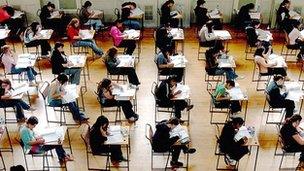Universities warn A-levels leave students 'unprepared'
- Published

A-level courses should encourage pupils to develop the ability for "independent thinking", say lecturers
Universities want A-levels to be more intellectually stretching and with less spoon-feeding from teachers, according to a study from an exam board.
Cambridge Assessment, which runs the OCR exam board, found many lecturers believed students arrived unprepared for degree-level work.
Three-in-five lecturers said their institutions ran catch-up classes.
Education Secretary Michael Gove has called for greater involvement from universities in A-level standards.
Mr Gove has told exam regulators that the content and assessment of A-levels should be shaped by universities, working alongside exam boards.
Last week he told head teachers that exams should be conferred by "institutions of academic excellence such as our best universities".
'Less predictable' exams
Cambridge Assessment, a department of the University of Cambridge, carried out an 18-month study of what higher education wanted from the A-level system.
It found that lecturers were concerned about too much "teaching to the test" and warned that there was insufficient "independent thinking" in A-levels.
Lecturers want "less predictable" A-level exams, fewer re-sits and questions which are more open-ended and which would make pupils think for themselves.
The study showed that more than half of lecturers believed that newly arrived students were "unprepared" for studying at degree level.
The weaknesses were in areas where students had to think creatively for themselves - in academic writing, self-directed study and independent thinking.
The study found that 60% of lecturers said that their institutions had to provide "additional support classes", often focusing on writing and independent learning skills.
University challenge
Lecturers thought that pupils had been guided by schools to get the highest grades without being challenged to think more deeply about the subject.
There have been concerns that the rise in top grades makes it difficult for universities to identify the most able applicants.
The OCR exam board has been moving towards a greater role for university academics in setting A-levels.
"Over the past two decades, the design and content of qualifications has increasingly become the domain of government-funded bodies. One effect of this has been to disenfranchise university lecturers, tutors, and admissions staff," said OCR chief executive Mark Dawe.
A Department for Education spokeswoman said: "We need to keep A-levels robust, rigorous and relevant to match the best education systems in the world and to keep pace with universities' demands.
"That's why we are working with Ofqual and the exam boards to involve universities far more closely in the development of A-levels, including looking at the question of how the current modular structure impacts on students and their depth of subject knowledge and understanding."
This has been a repeated theme from Mr Gove, who has been calling for universities to play a greater part in the exam system.
In a speech to head teachers last week, he called for a shake-up of the exam system - and said that qualifications should be conferred by universities.
"We need to move away from an expensive and time-consuming culture of proliferating external examinations - modules, re-sits and retakes - towards fewer high-quality qualifications overseen and conferred not by commercial organisations but by institutions of academic excellence such as our best universities," said Mr Gove.
- Published8 December 2011
- Published14 October 2011
- Published18 August 2011